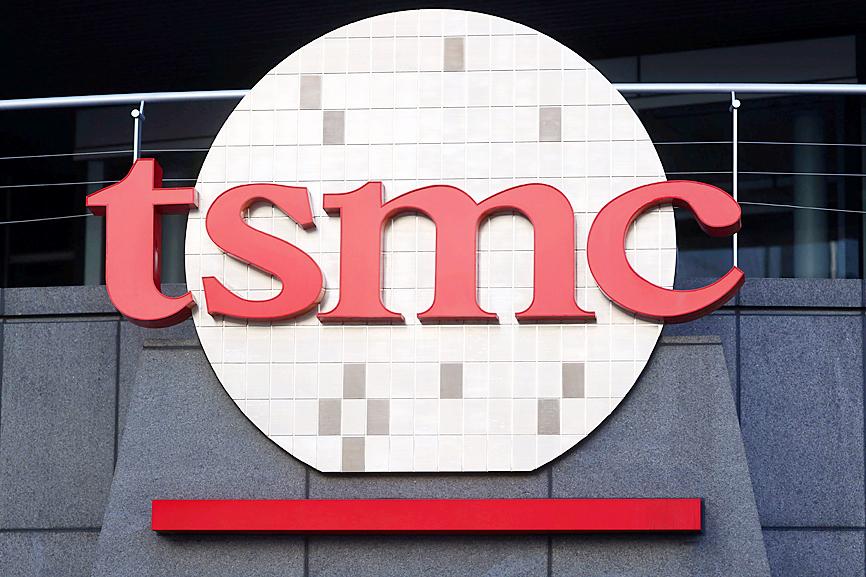Taiwan Semiconductor Manufacturing Co (TSMC, 台積電) shares tumbled 3.03 percent yesterday as investors worried about an Intel Corp plan to return to the foundry business.
The stock closed at NT$571 in Taipei trading, with turnover surging to 115.32 million shares, the most in about a month, after Intel chief executive officer Pat Gelsinger announced it would invest US$20 billion to build two new fabs in Arizona, as well as develop a new standalone foundry business to make chips for other companies.
At the same time, Intel would bolster its partnerships with third-party foundries to farm out more production, Intel said in a statement.

Photo: Ann Wang, Reuters
The move might create an awkward competitive-collaboration environment between the company and foundries.
The Santa Clara, California-based chipmaker is to offer intellectual property (IP) portfolios for customers, including for its own x86 cores, as well as Arm Ltd and RISC-V ecosystem IP, it said.
The announcement is a clear indication that “Intel is determined to come back to foundry business,” Cornucopia Capital Partner Ltd (聚芯資本) managing partner Eric Chen (陳慧明) said by telephone.
“This is certainly bad news for TSMC, but how bad it is depends on how Intel allocates its capacity and resources to fulfill its goal of becoming a world-class foundry,” Chen said.
All in all, it will require more than determination for Intel to become a real challenger to TSMC, the world’s biggest foundry service provider, he said.
“There is a long way to go,” Chen said, adding that TSMC has become a big foundry with significant capacity and IP investment.
“I doubt Apple Inc, Nvidia Corp or Advanced Micro Devices Inc will turn to Intel for chip supply, given unresolved lawsuits and direct competition,” he said.
Intel has lagged behind TSMC in advancing chip manufacturing technologies.
The US chipmaker yesterday said it is to enter the final design stage of 7-nanometer chips this year, while TSMC plans to start mass production of 3-nanometer chips next year.
“Intel is doing the right thing,” Chen said.
Its plan would allow the company to secure substantial subsides and resources from the US government, as Washington is pushing for products to be made in the US and reduce its dependence on TSMC for chip supply, he said.
In addition, Intel’s heavy investment in new fabs would attract suppliers of semiconductor components and materials to Arizona, making the state a major semiconductor manufacturing hub, like science parks in Taiwan, he said.
TSMC in 2023 plans to complete a new US$12 billion fab in Arizona to make 5-nanometer chips.

NEW IDENTITY: Known for its software, India has expanded into hardware, with its semiconductor industry growing from US$38bn in 2023 to US$45bn to US$50bn India on Saturday inaugurated its first semiconductor assembly and test facility, a milestone in the government’s push to reduce dependence on foreign chipmakers and stake a claim in a sector dominated by China. Indian Prime Minister Narendra Modi opened US firm Micron Technology Inc’s semiconductor assembly, test and packaging unit in his home state of Gujarat, hailing the “dawn of a new era” for India’s technology ambitions. “When young Indians look back in the future, they will see this decade as the turning point in our tech future,” Modi told the event, which was broadcast on his YouTube channel. The plant would convert

‘SEISMIC SHIFT’: The researcher forecast there would be about 1.1 billion mobile shipments this year, down from 1.26 billion the prior year and erasing years of gains The global smartphone market is expected to contract 12.9 percent this year due to the unprecedented memorychip shortage, marking “a crisis like no other,” researcher International Data Corp (IDC) said. The new forecast, a dramatic revision down from earlier estimates, gives the latest accounting of the ongoing memory crunch that is affecting every corner of the electronics industry. The demand for advanced memory to power artificial intelligence (AI) tasks has drained global supply until well into next year and jeopardizes the business model of many smartphone makers. IDC forecast about 1.1 billion mobile shipments this year, down from 1.26 billion the prior

People stand in a Pokemon store in Tokyo on Thursday. One of the world highest-grossing franchises is celebrated its 30th anniversary yesterday.

Zimbabwe’s ban on raw lithium exports is forcing Chinese miners to rethink their strategy, speeding up plans to process the metal locally instead of shipping it to China’s vast rechargeable battery industry. The country is Africa’s largest lithium producer and has one of the world’s largest reserves, according to the US Geological Survey (USGS). Zimbabwe already banned the export of lithium ore in 2022 and last year announced it would halt exports of lithium concentrates from January next year. However, on Wednesday it imposed the ban with immediate effect, leaving unclear what the lithium mining sector would do in the